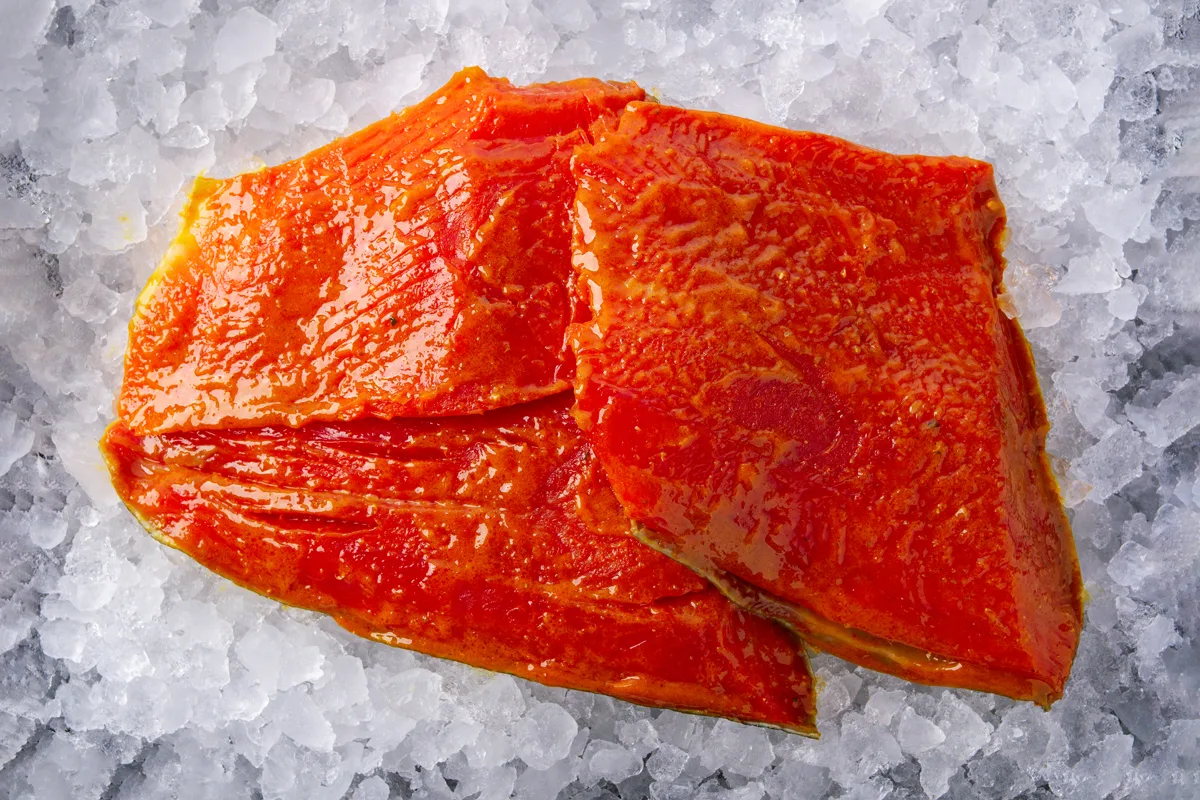Have you ever tried to grill fish, but it fell apart or dried out? It’s the most frustrating thing.
No one wants to eat fish that’s broken into several pieces of dry fish.
That’s why you should grill salmon. Salmon can stand up to the grilling process, will not break into pieces, and it is less prone to drying out.
To make your salmon even more flavorful, you can marinate it. However, you cannot marinate salmon for too long.
Knowing how long to marinate salmon will allow you to cook the most tender, moist salmon you’ve ever tasted.
However, let’s discuss the purpose of marinating salmon before we discuss how long to marinate salmon.
Contents
Does Salmon Need To Be Marinated?
The most apparent reason to marinate salmon is to add flavor to it. However, marinating salmon does have other purposes.
Marinating salmon can soften and tenderize it. The marinade also helps prevent the fish from drying out.
Ultimately you will end up with a tender, juicy, tasty, and delicious salmon fillet.
What Flavors Go Best With Salmon?
When marinating salmon, you must consider what flavors you want to add to the salmon.
Salmon is very versatile in that it pairs well with several flavors.
For example, you can use creamy, sweet, herb, salty, and salty marinades for salmon.
Each type of marinade will give the salmon a different flavor.
Nevertheless, the key to marinating salmon is ensuring the marinade flavors are balanced well.
If you want a salty marinade, add soy sauce, fish sauce, miso, olives, Worcestershire sauce, or capers to your marinade.
In contrast, if you prefer a sweeter marinade, combine brown sugar, hoisin sauce, maple syrup, molasses, or honey with an acid such as oranges or lemon juice, and olive oil.
However, do not add too much sweetener to your salmon.
The sugars will cause the salmon to burn, and no one likes burnt salmon.
If you prefer a tart marinade, add balsamic vinegar, lime, orange juice, apple cider vinegar, and lemon to your salmon.
However, do not add too much acid to your salmon. Acid can easily overpower the other ingredients in the marinade and overpower the salmon’s natural flavor.
Lastly, if you want to test out a new way of cooking salmon, use a smoky marinade.
Smoked paprika, toasted spices such as cumin or coriander, and dried or fresh chipotle chilis.
For creamy marinades, buttermilk, yogurt, cream cheese, butter, sour cream, and crème Fraiche all pair perfectly with salmon.
You can also use strongly flavored ingredients such as horseradish, onions, sesame oil, and olive oil.
You can also use fresh herbs such as bay leaves, coriander, parsley, fennel, or other herbs.
How Long to Marinate Salmon
How long to marinate salmon depends on the type of salmon you are marinating.
Marinating time for salmon also depends on how much flavor you want to add to it.
For example, salmon fillets can be marinated for 30 minutes to an hour.
However, salmon steaks can be marinated for 2 hours. If you are marinating salmon in an acidic base, the longest it can be marinated is 6 hours.
The USDA suggests salmon can be stored in the fridge for 1-2 days. However, this is a safety suggestion.
Salmon should never be marinated for more than 24 hours.
Ultimately you will end up with a dry, tough salmon fillet or steak, especially if you used an acid-based or salt-based marinade.
Salty and acidic ingredients add moisture to salmon. However, after 24 hours, a reversal effect occurs.
Essentially, these ingredients will remove the moisture they added to the salmon.
In addition to this, the acid will break down the protein fibers making the salmon soft and mushy.
Can You Freeze Marinated Salmon?
Of course, you can freeze marinated salmon. Simply place the salmon into the freezer. It will last for 3 months.
The marinade may develop an opaque color, and it may or may not solidify.
However, you should not panic if the marinade does not harden, as this is entirely normal.
Freezing the salmon will also prevent the salmon from over-marinating if you do not intend to cook it for a couple of days.
When you are ready to cook your marinated salmon, defrost it in the fridge or in cold water and cook your salmon according to the recipe.
How to Marinate Salmon
Since we are talking about how to marinate salmon, you will likely want to prepare salmon for lunch or dinner.
Luckily you can easily whip up a marinade for your salmon.
Combine olive oil, maple syrup, lemon zest, soy sauce, lemon juice, cilantro, salt, and pepper.
Pour the marinade into a zip lock bag and add the salmon fillets. Seal the bag to ensure the marinade or salmon fillets do not spill out of the bag.
Gently massage the marinade into the salmon fillets. Make sure the salmon fillets are covered with the marinade.
Let the salmon fillets sit in the fridge for 30 minutes or up to an hour. You must store the salmon in the fridge.
Leaving the salmon outside or at room temperature as it could be exposed to bacteria. Bacteria can lead to food poisoning.
To cook the salmon, remove it from the marinade and remove any excess herbs. The herbs can burn on the grill.
Preheat your natural gas grill or indoor grill to medium-high heat. Grill the salmon fillets for 5-6 minutes until it has an opaque pinkish color.
Final Thoughts
Salmon is a tasty, nutritious fish that is meant to be grilled. However, if you really want to take salmon’s flavor to the next level, try marinating it.
Marinating salmon prevents the salmon from drying out as it cooks on the grill.
More importantly, it adds tons of flavor to the salmon.
Remember to marinate salmon fillets for 30 minutes and salmon steaks for 2 hours.
However, do not exceed 24 hours, or you will end up with a dry mushy piece of salmon instead of a tender, juicy piece of salmon.
You might also be interested in the following:
- How Long to Marinate Beef Jerky
- How Long to Marinate Ribs
- How Long to Marinate Chicken Thighs
- How Long to Marinate Tofu
- How Long to Marinate Flank Steak
- How Long to Marinate Pork Chops
- How Long to Marinate Chicken in Buttermilk
- How Long to Marinate Shrimp
- How Long to Marinate Steak
- How Long to Marinate Chicken

I have been smoking and grilling meat from an early age and enjoy sharing my knowledge and expertise through the hundreds of articles I have written about BBQ. I hope to make everyone’s BBQ journey that little bit easier.

